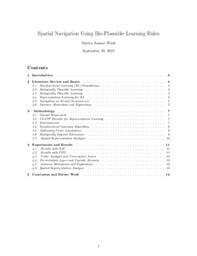Spatial Navigation using Bio-Plausible Learning Rules
Spatial navigation is a fundamental cognitive ability that allows organisms to explore, learn, and adapt within their environments. In neuroscience, studies of the hippocampus and grid cells reveal how biological systems encode spatial maps for efficient navigation. Reinforcement learning (RL), inspired by reward-based decision-making, provides a computational framework for modeling these behaviors. Bio-plausible RL combines insights from neuroscience with RL algorithms to mimic natural learning processes, emphasizing local learning rules, neural dynamics, and memory-based strategies. Applying this approach to spatial navigation enables the development of intelligent agents that learn robust, adaptable paths while offering deeper understanding of brain-inspired computation.

Please sign in
If you are a registered user on Laidlaw Scholars Network, please sign in